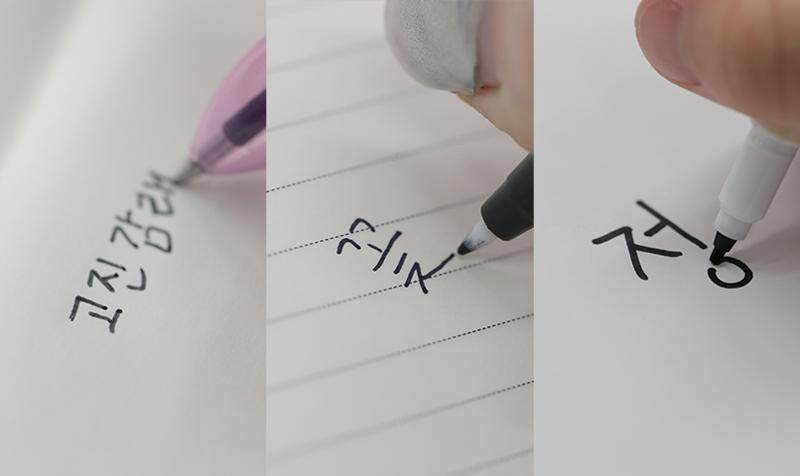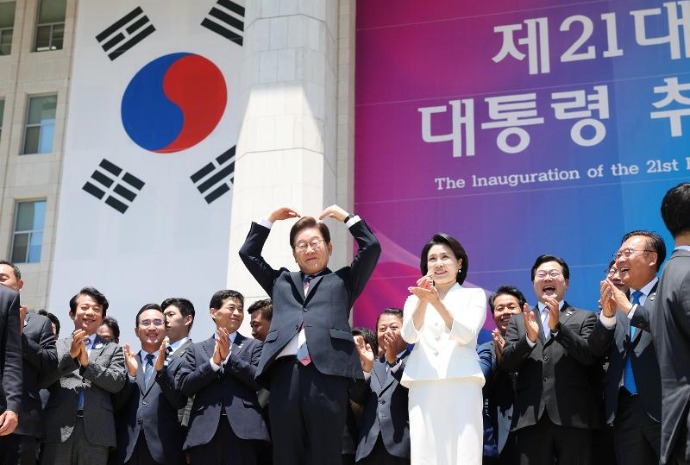
(From left) Elena Kubitzki, Elias Molina and Sarah Oqelee on Oct. 8 pose for a photo after discussing the Korean language and Hangeul at Korea.net's studio in Seoul's Jongno-gu District.
By Kim Hyelin and Yoon Sojung
Photo = Kim Sunjoo
Seoul | Oct. 8, 2020
Kubitzki: I'm not Korean but feel that Hangeul Day is special every year. Isn't that strange?
Oqelee: No, and that's because we learn Hangeul characters when studying the language. Every Hangeul Day, I always write a letter to someone in Korean. It's my fifth month working here, so for this year, I'll write letters to my seniors at Korea.net to thank them.
Molina: I've been learning Korean for ten years already. Now I even dream in Korean (laughter). So how did everyone learn Korean?
Kubitzki: In high school, I first traveled to Korea and grew interested in the country after feeling a connection to Koreans and the beauty of their country. Afterwards, I entered university in Germany as a Korean studies major and started learning Korean.
Oqelee: I didn't dream of anything special but at age 14, I watched the K-drama "Autumn in My Heart" on TV. I then set as my goal living in Korea. I was curious about the country as its culture seemed very different from Egypt's. I enrolled in Korean classes at the Korean Embassy in Egypt run by the Korea International Cooperation Agency (KOICA). I came to Korea as a student through an invitational scholarship program of the Korean government for university students.
Molina: Everyone seemed to have worked hard before coming here. I studied Korean after entering university. I still remember the numerous headaches I suffered because I had to memorize a lot when first studying Korean. I was so proud of myself for knowing a few simple words like oi for cucumber and podo for grape. Now I'm using Korean while working, so I feel refreshed.
|
|
 |
 |
|
|
Name |
Sarah Oqelee | Elias Molina | Elena Kubitzki |
|
Nationality |
Egypt |
Costa Rica |
Germany |
| No. of years studying Korean (Length of stay in Korea) |
10 years (8) |
10 1/2 years |
5 years (4 1/2) |
|
Language team at Korea.net |
Arabic | Spanish | German |
Oqelee: Haha, right. At first, it was hard to distinguish the simple pronunciation of ㅁ and ㅂ. Everyone, what was the most impressive part of learning Korean?
Kubitzki: I love the expressiveness of the Korean language. It has more vocabulary than German to express taste, feelings, emotions, colors and weather. So it was interesting to use more accurate words to express myself in Korean. But equally interesting was how I could be ambiguous in speaking Korean when needed.
Oqelee: Indeed. I also thought Korean has a rich vocabulary to express emotions. The Arabic language also has words to express emotions but they're not as accurate or detailed for expressions such as "You did a fine job," "Good job" or "Frustrated.” I guess I learned again how to express my emotions and opinions while learning Korean.
Molina: Another unique part is politeness. In Korean, certain words change according to the relationship among the people in a conversation. The word jip (house) changes to daek and the same happens with saengil (birthday), which changes to saengsin, when used with someone older or of a higher status.
Oqelee: I think Korean always considers the other party and puts his or her feelings first. You can find jondetmal (honorific language) in a conversation between two strangers. On the other hand, in banmal (informal language), a power exists to break down an invisible wall in people's minds. I even became friends with someone whom I met for the first time while speaking banmal.
Molina: I know how that feels. You quickly get close. Also, Korean has more onomatopoeia or mimetic words than other languages. This was especially true when I read history-themed comic books. When such words are gathered, they even look like part of a picture.
Kubitzki: I guess that's because Hangeul is also beautiful in design. I thought the letters were pretty even when I didn't understand their meanings. I think Hangeul has many charms.
Molina: Right. When I began studying Hangeul, I learned that vowels and consonants are shaped like vocal organs. I found it logically ordered.
Kubitzki: It's amazing that once you master spelling, you can make any words by combining these letters in countless ways. This way, you can write in Hangeul any foreign language that is difficult to pronounce.
Oqelee: What makes Hangeul special is that it was invented by a ruler who wished to make his people more comfortable. Because of this, many people in the Joseon Dynasty era were able to learn and write their language, which is still widely used today.

Korea.net's foreign staff write their favorite Korean words. (From left) Sara Oqelee wrote gojingamrae, a Chinese proverb meaning "No pain, no gain"; Elena Kubitzki wrote kkot (flower); and Elias Molina wrote jeong (affection).
Molina: I guess many Korea.net readers have interest in Korean or are already learning it. Based on our experience, what advice would you give them?
Oqelee: Don't rely on books only when studying (laughter). It's important to practice speaking. I've lived in Korea alone and so sometimes I don't utter a single Korean word in a day. If I could return to my university years, I would live in a dormitory with Koreans.
Molina: I agree. When watching Korean TV dramas or movies, I find them interesting and can learn useful expressions for daily life, so they're very helpful. If you study Korean, the door to Korean society will be opened to you. You can access vast information and deepen your connections with people here. If you want to learn more about Korea, you must learn the language.
Molina: About ten years ago, Korea wasn't widely known in the world. But thanks to an improved global image, Korean has gained competitiveness as a foreign language. In Costa Rica, most people used to know nothing about Korea but they now consider Korean ability an advantage. This is because of job prospects at Korean companies operating in the country. Moreover, Korean has a low entry barrier. You don't need to memorize many Chinese characters and learning the alphabet is easy. If a foreigner wants to learn an Asian language, I consider Korean a good choice.
kimhyelin211@korea.kr

